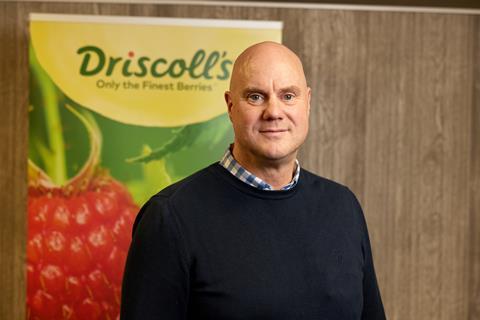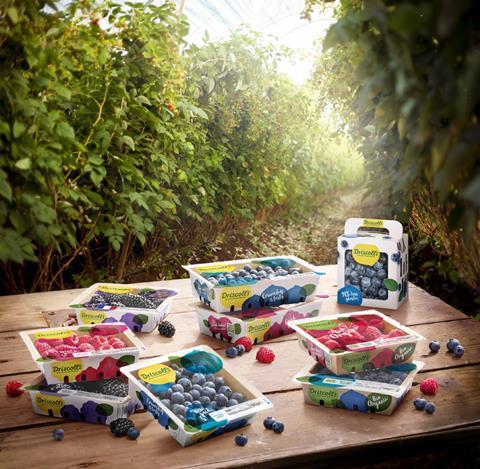Exclusive interview: Efficient berry production, better sales and new exports are all part of Driscoll’s plans for UK grower cooperative Berry Gardens, group’s EMEA managing director Russell Allwell tells the FPJ
US global berry giant Driscoll’s completed the acquisition of Berry Gardens Limited (BGL), the sales, packaging and distribution entity of leading UK berry cooperative Berry Gardens Growers Limited (BGG) on 1 November. What does this mean for the UK berry sector?

Russell Allwell: The deal is a win-win for everybody. For the growers, Driscoll’s provides stability; clear access to our varietal programmes; greater access to our proprietary technology and techniques; and, since we are a global business, access to global markets. This is a big deal, because UK fruit is fantastic and in demand.
For our [retail] customers, I think that we will keep providing the strong genetics and varieties that we have had to date, but there will also be an accelerated pipeline of new varieties coming through, as well. By us having a much clearer path in conversation with them, we will be able to better tailor our programmes to the customers and their needs, and really get into specifics around these new varieties and what we can do to stimulate growth in their categories.
There is also continuity for our customers from a variety point of view. When we move out of the local season, we can maintain a level of continuity in terms of quality and the varieties that the local consumer sees – it will be a lot more seamless through Driscoll’s.
What does the acquisition mean for Berry Gardens as a business?
In terms of the structure, initially there aren’t going to be massive changes. [Berry Gardens Ltd CEO] Nick Allen will be joining the Driscoll’s Europe team and he will be UK general manager.
In terms of the name, over time we are going to change Berry Gardens across to Driscoll’s. Berry Gardens has a great reputation and it is a great business, so we are proud of being part of Berry Gardens. But this is Driscoll’s and to avoid, confusion we will transition across to Driscoll’s.
For the local [Berry Gardens Ltd] team – they are super excited about the opportunity of joining a broader bigger international business. That brings lots of career opportunities, learnings and insights, so they are very optimistic from a personal perspective that the move to Driscoll’s will be a solid and good one for them.
What is Driscoll’s strategy for growing domestic UK berry production?
Our strategy is really focusing on three key elements: strengthening dialogue in the marketplace, being consumer-led, and operational efficiencies.
When we talk about dialogue, it is really about having a strong dialogue with the retailers and our growers. We recognise coming in [to Berry Gardens] that we have strong partners in the growers and the customers with a long history and experience in the berry category. So, we want to make sure we listen and we learn and understand their points of view.
But obviously we are a fifth-generation business in berries as well, and we have had success in growing our business. So, we think there are opportunities for us to offer some insights along the way, and that’s where this thing about dialogue comes in. It’s really about communication.
As I say, we are a fifth-generation business. We are here for the long-term. One of the important elements is around being consumer-led. All we do is berries, so we have a lot of experience in varietal development. We have a lot of experience in category building. Our growth is traditionally driven on consumer behaviour and insights, so we very much want to bring that to the category as a way of how we grow the business.
We also think it is very important to have a financially strong grower base. We see two elements to it. One is about creating value through these consumer-driven initiatives. The other is around operational efficiency: how to make sure the growers have a sustainable path forward.
Is the goal of the acquisition to import more European berries into the UK?
We didn’t need to buy Berry Gardens to import fruit. We purchased their sales desk to sell local berries. That’s our focus. That’s what we are about: to satisfy local demand with local product. Because it’s a really strong, quality product offering. We think there is still lots of growth for local fruit in the UK and that’s really where our energy lies.
Does that mean we won’t bring berries in on occasion? On occasions we will, but that should be outside the local season. We want to prioritise local fruit first. And our job is to make sure that we satisfy the customers’ demand and the consumers’ demand. Where there is a void for local fruit then we have the means to maintain the quality and continuity of sale and we should do that.
What about developing UK berry exports – is that part of the plan?
The quality of the UK fruit is very high and is very consistent, and we have customers and consumers all over Europe and the Middle East who would love to consume UK fruit and so we see no reason why we shouldn’t look at how we continue to create growth for UK growers and we should look at those opportunities.
I emphasise our number one priority it to satisfy the local market – that is our first job. But if there are customers and consumers who say they would love an English strawberry, why should we deny them.
Does Driscoll’s have a strategy to help UK berry growers mitigate production and market challenges for the coming seasons?
There are a few challenges in the marketplace at the moment. I come back to these two key pillars that we are working on with our growers. It’s about operational efficiency and it’s about creating value. It really does come down to those two elements.
For us, we need to make them operationally efficient; we need to take as much wastage out of the system as we can. We know that we can get better at planning, it’s an important element. And that’s a relationship our customers and growers play a part in.
Driscoll’s has invested heavily in integrated business planning, which is all about how you marry up your supply and demand curves, and that is helping to reduce a lot of waste and inefficiency at farm-level, but also through the supply chain which benefits the customer as well.
We have a lot of different new varieties coming through that also impact on plant densities, harvest speeds and operational costs, so we are keen to push those sorts of elements through to the growers as well.
But, we are also in the business of creating value and demand. For Driscoll’s it’s very much about trying to create flavourful fruit that is good value, which is going to build repeat purchase and consumer loyalty. That is what the category needs. Value starts not with price but with great flavour.
It’s also about how you make the category relevant for shoppers. And there are a lot of consumer needs that we are focusing on. A good example is consumer concern about single-use plastics in the marketplace. So, in 2023 we are moving the Driscoll’s brand out of plastic into paperboard punnets. That initiative has been going for a couple of years. We are well under way in the roll out of that, and we hope by the end of 2023 that we have moved completely out of plastic into paper. That will stimulate a lot of interest among consumers in Europe around the Driscoll’s brand.

How can a premium berry brand survive what’s coming in terms of the economic decline and cost-of-living crisis?
I think that the [berry] category will need to have stronger value offers. The bottom end of the market will always need lower price value offerings. But the market is still going to be looking for ways of aligning the category to what is relevant for the consumer, so there will definitely be two tiers of pricing. As long as you can maintain relevance to consumer needs and deliver consistent, great flavoured fruit, day in, day out, I still think there is a definitely a strong role [for premium berry brands]. Consumers and the category need repeat purchases, and to achieve that category loyalty they need to have great flavoured fruit. That’s what we are relying on.
Can you talk a little bit about your professional background and links to the fresh produce sector?
I have been in Driscoll’s about 12 years. I am Australian. I came into Driscoll’s Australia – a joint venture set up by Driscoll’s and [Australian produce giant] Costa Australia. They needed someone independent to come in and manage this joint venture. It was my first foray into berries, and I was hooked by day one. It is an incredibly fun, dynamic environment.
My role was to bring Driscoll’s and Costa together, and to find ways that we could capture the strengths of both organisations and push them into a stronger position in the market that worked really well.
I kind of draw on a little of that experience with the Berry Gardens deal. It’s a similar thing where we have a very strong business in Driscoll’s and a very strong business in Berry Gardens. In merging the two together, we need to make sure we don’t lose anything that is the foundation of their success.
Similarly, in setting up Driscoll’s Australia and developing the categories with the Australian retailers, it was a situation of listening, learning and understanding. Getting a greater understanding of the consumer. So I see a lot of parallels in terms of innovating and growing the UK berry category from the experiences we had 12 years ago. Obviously, the UK category is more mature and developed than the Australian category then, but the same skills apply.
I then moved across to Driscoll’s Asia, to help develop the market for Driscoll’s across the Asia market. Then I moved across to run Driscoll’s of Europe.
I’ve really loved my time at Driscoll’s of Europe, there are so many different customers, different cultures, different consumers, different behaviours, different growers. It’s been fascinating to really test how you navigate through all those things. It’s testimony to Driscoll’s ability to partner when you look at the complexity that Europe brings.
The foundation of our strength in Europe is the ability to do that: to be good listeners and to apply strong innovations. And we have to bring those to the UK as well.
Is there anything else you would like to add?
I am just super excited about the opportunity. We have got a lot to offer and a fantastic base to work from with really strong relationships. As I said at the start of this conversation, we see this as a win-win for everybody, and that’s what makes this a great deal – and something everybody is super excited about.
Listen to Russell Allwell’s interview with Fruitnet’s Chris White in episode 92 of Fruitbox here



